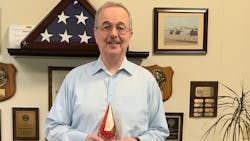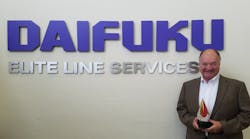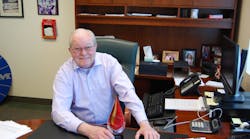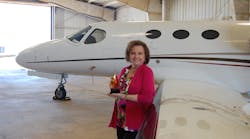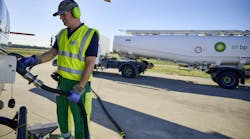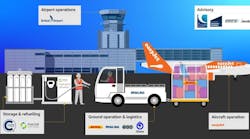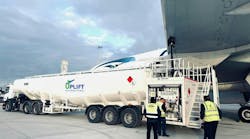A successful flight begins with the work performed on the ground, and supplying clean, dry fuel is a fundamental element of that safety.
According to Jim Gammon, president at Gammon Technical Products (GTP), there are three things of no use to a pilot – the runway behind; the altitude above; and the fuel still in the refueler truck. And so, he has delivered steadfast work centered on making the industry as safe as it can be.
“Jim is a born leader – the type of guy that everyone respects, that everyone listens to,” says Jeff Langtip of C&L Sales and Services Pty Ltd. “Jim is involved in everything related to the industry and in my view, the most genuine and respected in this industry. I have never ever heard an unfriendly or unkind word in a conversation about Jim.”
For his dedication to aircraft fueling safety, Gammon has been recognized with Ground Support Worldwide’s Lifetime Achievement award.
“Hundreds of people before me set a high standard and a noble goal, make air travel safe. Many of them deserved an award more than I do,” Gammon says. “I hope to inspire younger people to dedicate themselves to the same goal.”
His Father’s Influence
The company that bears the family name began in 1960, when Howard Gammon, Jim’s father, quit his job as chief engineer at Purolator Filters.
“He built our company from nothing in our garage and basement,” Gammon recalls, noting he started working part-time for his father around the age of 12.
“Dad took it upon himself to be my professor and did so until 2018, when he passed away at 95,” Gammon continues. “I have nothing but respect for my dad. He is my hero.”
Early on, Gammon loved the aviation industry and found it interesting. He found work as a teenager at Central Jersey Regional Airport – known then as Kupper Airport, near New Brunswick, N.J.
“When I was 16, I had a summer job at a tiny airport, refueling light aircraft and cleaning the bellies of Cessna 150 trainers,” he notes. “And I got my pilot’s license that summer, working at the airport. I had a pilot’s license before I got my driver’s license.”
At Gammon Technical Products, Gammon worked his way up from shipping, to assembly, to valve rebuilding, to constructing refueling cabinets, to engineering and education. He ultimately became president in 2002.
“I started with my dad full time in late 1974 when I was 21. I was attending engineering school at the time. But I just could not apply myself to subjects I didn’t find interesting, and now I know why. Today it’s called Attention Deficit Disorder (ADD),” Gammon recalls. “Back then, my Dad called it another name, a lack of discipline.”
Under the tutelage of his father, whom Gammon describes as a very careful, old fashioned businessman, he learned everything he needed to succeed in the business.
“Being at airports and ‘getting fuel in my shoes’ is what learning is all about. You learn most form the old timers,” he says.
Gammon’s ability to understand machinery, flow and contamination made his fascination with the aviation industry a perfect match for a career path.
“I think understanding flow dynamics is most important. If you cannot look at a system and pick out the restrictions and how filters and control valves work, you’ll never fully understand how the system works,” he says.
Gammon is proud of the work his company has produced for the industry.
“We have designed and built many of the small and relatively inexpensive items used in fuel handling, from the sample QD to the Gammon Gauge and Viper additive injector. We were the first to bring Intrinsically Safe (IS) power to aviation water sensing probes and deadman handles,” Gammon says, noting the importance of IS power remaining so low that it cannot spark a fire.
“Jim now, and his father Howard before him, have been the leaders in fuel quality and innovation for everything related to aviation fuel,” adds Langtip.
Educating the Industry
Gammon says his objective has always been education – not sales.
For these efforts, Langtip considers Gammon an industry icon.
“Leadership, honesty, integrity and intelligence. Now add common sense with some life experience to that mix – rare traits for one person,” Langtip says. “This is Jim Gammon.”
In addition to his responsibilities at GTP, Gammon was invited to be part of the National Air Transportation Association (NATA) Line Service Training Program, which he accepted on a volunteer basis for more than 20 years. He has also given hundreds of seminars for various companies around the world, including major oil companies and airlines.
“It is just good business to help people know why they are doing things – and what to look for,” he explains.
Gammon recalls that focus on education proving valuable when he received a phone call from a student who said he saved two lives due to effective training.
“A mix of fuels had taken place and he radioed the pilot as he was climbing out. He told him, don’t switch to the auxiliary tanks, turn around and land immediately,” Gammon remembers. “Due to his increased vigilance, he caught his people mixing jet and avgas due to a paperwork screwup. All I did was impress on him to be thorough, and he said that was how he caught the problem before the pilot switched tanks.”
That attention to detail was another lesson passed on to Gammon by his father Howard.
“My Dad said long ago, do the job right and everything else sorts out in the end,” Gammon recalls.
“Shell had an old training video called ‘The 10,000th Time.’ The point was that while you may do 9,999 tests without finding contamination. One single bad test result makes them all worthwhile,” he says. “The fact that contamination is rare and that when it does occur it is not widely reported, allows complacency. That should be our greatest concern.”
Gammon’s focus on education has led to other endeavors as well.
“Our company, Gammon Technical Products, also is well known for producing an educational publication, the Gamgram,” he says. “There are 72 articles, so far, written over the past 45 years covering all aspects of aviation fuel handling, quality control and how all the equipment works, and why. It is considered around the world as a primer for everyone getting into aviation fuel handling and has been translated into at least three languages.”
In 2017, Gammon coordinated the first Aviation Fuel Handling Training Symposium.
“I didn’t anticipate how much of a draw there would be,” Gammon said shortly after the inaugural event, adding it was created to serve as a networking and training opportunity rather than a revenue generator.
The event grew in 2018 and 2019, and after taking a year off the Aviation Fuel Handling Training Symposium will take place in Las Vegas later this year in conjunction with the International GSE Expo.
“It’s been a labor of love to bring this symposium together and provide a means for people to communicate and share information and learn from each other,” Gammon said during the 2018 event.
The biggest challenge in helping keep the industry educated, is the vast amount of information available coupled with a declining number of subject experts.
“When I got into the business, there were at least three times as many professionals involved, but budgets have pared this down to a point where there are too few truly knowledgeable people,” he says.
However, he notes that being involved with American Society for Testing and Materials (ASTM) has proved beneficial as he says the organization is filled with experts on various aspects of fuel handling.
Focus on Safety
According to Gammon, all the people in fuel handling share one thing – they are not appreciated.
“The industry is seen as a necessary, smelly evil. The single greatest expense to an airline is fuel,” Gammon says.
“It should be recognized that fuel handlers are the only element of flight safety that is unregulated by the FAA - and yet they have the best record,” he continues. “Once an FAA expert once told me, ‘As long as your part of the industry keeps doing the job right, you’ll remain the only aspect of flying that the FAA doesn’t regulate.’”
The fueling industry’s attention to detail must be sharply focused to avoid catastrophe. Gammon notes the fueling industry thinks of a particle one-tenth the diameter of a human hair as though it is the size of a boulder.
“Our jet fuel is so clean and pure that is amazing that we are all able to do this, every day, all around the world, and do it so well that the FAA chooses not to regulate us,” he says. “They have no need to. Our record proves our worth.
“This is an industry that is invisible, unless something goes wrong,” Gammon continues. “I place a lot of the credit with my teacher, my mentor, my dad – and all the others who share the responsibility to ‘keep ‘em flying.’”
Gammon says he has had the pleasure of working with hundreds of people, both military and commercial, at various organizations including the ASTM, Coordinating Research Council (CRC), SAE International, National Fire Protection Association (NFPA), NATA, Energy Institute (EI), Joint Inspection Group (JIG), National Petroleum Management Association (NPMA) and the International Air Transport Association (IATA). While his work has been recognized by awards from both the ASTM and NPMA, Gammon applauds the many others working throughout the aviation fueling industry for their work in achieving flight safety.
“I am proud to say that our industry has many true professionals. I am proud to work with so many people who disregard company rivalries and politics to keep air travel safe,” he says.
“I also owe a lot to our employees and to my wife, Wanda, who runs a significant portion of our company and has tolerated all my traveling over the past 47 years,” Gammon says, adding he has no plans to retire yet.
“Receiving this award is to be recognized as a member of an unheralded fraternity of professionals, men and women, around the world dedicated to flight safety. People from every race, religion, nationality and from the youngest beginner to those long gone who took the time to teach me and so many others. I accept this award in their honor and I am proud to be considered one of that group of professionals.”
